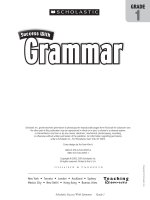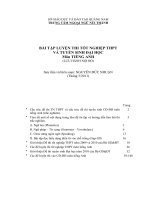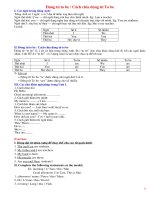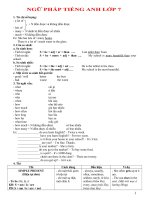TAG QUESTIONS (NGỮ PHÁP VÀ BÀI TẬP)
Bạn đang xem bản rút gọn của tài liệu. Xem và tải ngay bản đầy đủ của tài liệu tại đây (108.96 KB, 4 trang )
TAG QUESTIONS
( Câu hỏi đuôi, lối nói phụ họa)
I. Tag questions: ( câu hỏi đuôi)
1. Câu hỏi đuôi gồm có: chủ từ (phải là đại từ nhân xưng) và trợ động từ
hay động từ đặc biệc.
2. Nếu câu phát biểu ở thể xác định thì câu hỏi đuôi ở thể phủ định và
ngược lại.
3. Nếu câu hỏi đuôi ở thể phủ định thì phải dùng hình thức tĩnh lược
(contractive form).
Ví dụ:
STATEMENTS QUESTION-TAGS
He is a good boy,
The girl didn't come here yesterday,
They will go away,
She hasn't left,
isn
’
t he?
did she?
won't they?
has she?
• NOTES:
a. Phần đuôi của “ I am” là “ aren’t I “ .
Eg: I’m going to do it again, aren’t I?
b. Imperatives and Requests ( Câu mệnh lệnh và câu yêu cầu):
+ Có phần đuôi là “won’t you?” khi câu phát biểu diễn tả lời mời:
Eg: Take your seat, won’t you? (Mời ông ngồi)
+ Có phần đuôi là “will you?” khi câu phát biểu diễn tả lời yêu cầu hoặc
mệnh lệnh phủ định
Eg: - Open the door, will you? ( Xin vui lòng mở cửa)
- Don’t be late, will you ? (Đừng đi trễ nha)
c. Phần đuôi của câu bắt đầu bằng “ Let’s ” : là “shall we ?”
Eg: Let’s go swimming, shall we?
Nhưng phần đuôi của “Let us . Let me” là “will you”
d. Nothing, anything, something, everything được thay là thế bằng “ It” ở
câu hỏi đuôi:
Eg : Everything will be all right, won’t it?
No one, Nobody, anyone, anybody, someone, somebody, everybody,
everyone được thay thế bằng “They” trong câu hỏi đuôi.
Eg: Someone remembered to leave the messages, didn’t they?
•
NOTE : Nothing, Nobody, No one được dùng trong mệnh đề chính, động
từ ở câu hỏi đuôi sẽ phải ở dạng thức xác định. (Vì Nothing, Nobody, No
one có nghĩa phủ định)
Eg: Nothing gives you more pleasure than listening to music, does
it ?
e. This. That được thay thế là “It”.
Eg: This won’t take long, will it?
f. These. Those được thay thế là “They”.
Eg: Those are nice, aren’t they?
g. Khi trong câu nói có từ phủ định như: seldom, rarely, hardly, no, without,
never, few, little… phần đuôi phải ở dạng khẳng định.
Eg: He seldom goes to the movies, does he?
h. Nếu câu phát biểu có dạng : You ‘d better → câu hỏi đuôi sẽ là : hadn’t
you ?
You’d rather → câu hỏi đuôi sẽ là : wouldn’t
you ?
You used to → câu hỏi đuôi sẽ là : didn’t
you ?
II. Additions to remarks: ( Lối nói phụ họa)
1 Phụ hoạ câu khẳng định
Khi muốn nói một người hoặc vật nào đó làm một việc gì đó và một
người, vật khác cũng làm một việc như vậy, người ta dùng so hoặc too. Để
tránh phải lặp lại các từ của câu trước (mệnh đề chính), người ta dùng liên từ
and và thêm một câu đơn giản (mệnh đề phụ) có sử dụng so hoặc too. Ý nghĩa
của hai từ này có nghĩa là “cũng thế”.
Ex1: We are going to the movie tonight, and he is too.
Ex2: We are going to the movie tonight, and so is he.
Ex1: John went to the mountains on his vacation, and we did too.
Ex2: John went to the mountains on his vacation, and so did we.
Ex1: I will be in VN in May, and they will too.
Ex2: I will be in VN in May, and so will they.
Ex1: He has seen her play, and the girls have too.
Ex2: He has seen her play, and so have the girls.
2. Phụ hoạ câu phủ định
Cũng giống như too và so trong câu khẳng định, để phụ hoạ một câu phủ
định, người ta dùng either hoặc neither. Hai từ này có nghĩa “cũng không”. Ba
quy tắc đối với trợ động từ, động từ be hoặc do, does, did cũng được áp dụng
giống như trên. Ta cũng có thể gói gọn 3 quy tắc đó vào một công thức như
sau:
Ex1: I didn't see Mary this morning, and John didn't either
Ex2: I didn't see Mary this morning, and neither did John.
Ex1: She won’t be going to the conference, and her friends won’t
either.
Ex2: She won’t be going to the conference, and neither will her
friends.
Ex1: John hasn’t seen the new movie yet, and I haven’t either.
Ex2: John hasn’t seen the new movie yet, and neither have I.
EXERCISE :
A. Add tag questions to the following.
1. They want to come,………………….?
2. Elizabeth is a dentist, ……………… ?
3. They won’t be here, …………………?
4. That is your umbrella, ………………….?
5. There aren’t many people here yet, …………… ?
6. He has a bicycle,……………………?
7. Peter would like to come with us to the party, …………………… ?
8. Those aren’t Fred’s books, ………?
9. You have never been to Paris,…………?
10. Something is wrong with Jane today, ………… ?
11. Everyone can learn how to swim, ……………… ?
12. Nobody cheated in the exam, ………………… ?
13. Nothing went wrong while I was gone, ………… ?
14. I am invited, ………………….?
15. This bridge is not very safe,…………… ?
16. These sausages are delicious, …………….?
17. You haven’t lived here long, …………?
18. The weather forecast wasn’t very good, ……………. ?
19. He
’
d better come to see me, ?
20. You need to stay longer, ?
B. Circle the best answer.
1. You have seen this film, ____?
A. haven’t you B. have you C.do you D. don’t
you
2. You often have bread and milk for breakfast, ____?
A. haven’t you B.have you C.do you D. don’t
you
3. You won’t leave me, ___? A. will you B.won’t you C.am I D. do you
4. There are many flowers in the garden, ___?
A.aren’t they B.isn’t it C.aren’t there D.is it
5.There is nothing in the fridge, _?
A. is there B.isn’t there C. is it D.isn’t it
6. He never drinks wine, ___?
A. doesn’t he B. does he C. hasn’t he D.won’t
he
7. He can speak three languages, ___?
A. can he B.can’t he C.isn’t he D. is he
8. Nobody knows her name, ___?
A.do they B.don’t they C.isn’t it D.is it
9. You used to go to school on foot, ___?
A.weren’t you B.were you C.did you D. didn’t
you









